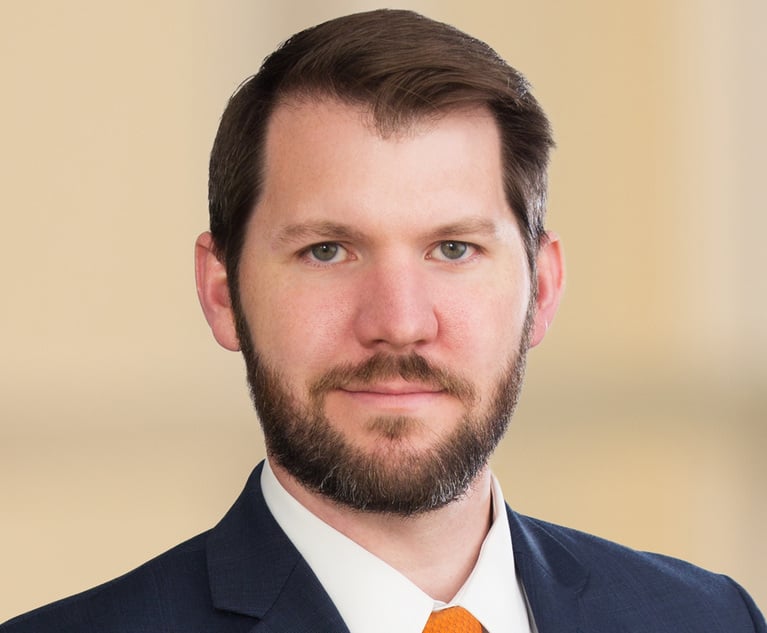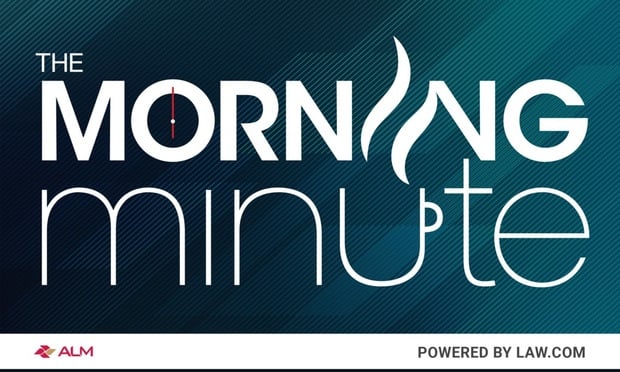Is It Time for the Legal Industry to Stop Following NY?: The Morning Minute
The news and analysis you need to start your day.
June 28, 2021 at 06:00 AM
5 minute read
Want to get this daily news briefing by email? Here's the sign-up.
WHAT WE'RE WATCHING
IS NEW YORK OLD NEWS? - New York has long set the standard for the rest of the legal industry on everything from salaries to workplace culture to industry status and practice area focus. But, as Law.com's Patrick Smith reports, more and more firms are beginning to realize that they're doing themselves no favors by trying to keep up with the Wall Street elites. "Everything is benchmarked after New York," Jennifer Johnson, CEO and founder of legal consulting firm Calibrate Legal, told Smith. "Many are still chasing that. But New York will always lead with money, and that isn't the way the rest of the country operates." Kent Zimmermann, strategy consultant to law firm leaders at Zeughauser Group, suggested that a healthier strategy for law firm leaders would be to simply look slightly up-market from where they happen to be. "All firms are somewhere on a ladder, and what that looks like depends on where you are starting your climb from," he said. "If you are in St. Louis, you might be looking at some Chicago firms. If you are in Chicago, maybe then it makes sense to look to New York, London and Northern California. You don't want to be an also-ran in New York."
WHAT ARE THE CHANCES? - The oft-repeated claim that spontaneous run-ins with colleagues in the office tend to spark great innovations is a little like saying people tend to meet their soulmates on Tinder. Sure, it probably happens, but it's not exactly the norm. In fact, according to a recent New York Times article, academics and corporate leaders who study the workplace have found no empirical evidence that ties office attendance to creativity and collaboration. Still, as Law.com's Dan Packel writes in his most recent "Law Firm Disrupted" column, it may not be innovation so much as education that firms are after in trying to push attorneys back to the office. After all, chance encounters in the hallway may not be leading to as many incredible breakthroughs as some law firms leaders would have you believe, but it's easy to imagine them leading to teachable moments for younger attorneys. Even so, it's clear firms are going to need to figure out a way to make professional development work in an environment in which not everyone is physically together at the same time. "In the end, lawyers are going to be working from home far more than they did prior to COVID-19," Packel writes. "Given a competitive talent market and the clear appeal of flexible work, it's going to be impossible to get the toothpaste back into the tube."
COLD SWEAT - Growth stage tech company Swoop Search sued Sweat Equity Partners, TurbineOne and TurbineOne co-founder Matthew Amacker on Friday in Wisconsin Western District Court for alleged breach of contract and misappropriation of trade secrets. The suit accuses Sweat Equity Partners, which provides engineering support to startups in exchange for equity, of violating a confidentiality agreement and using Swoop's proprietary information and technology to launch a competing company. Swoop Search is represented by Fredrikson & Byron and Quarles & Brady. Counsel have not yet appeared for the defendants. The case is 3:21-cv-00417, Swoop Search, LLC v. Sweat Equity Partners, LLC et al. Stay up on the latest deals and litigation with the new Law.com Radar.
EDITOR'S PICKS
- How Britney Spears Became an Icon for Reproductive Justice By Katheryn Tucker
- Law Firms Risk Losing Ground If They Don't Keep Pushing For Equity By Lizzy McLellan
WHILE YOU WERE SLEEPING
DUTCH FIRM DITCHED - Just eight years after launching the Amsterdam-based boutique firm Rutgers & Posch, a third of the six founding partners are jumping ship, Law.com International's Linda A. Thompson reports. Founding partner Hendrik Jan Schimmel is joining Taylor Wessing's real estate practice along with three corporate real estate lawyers: Fabian Stevens, David Weinstein and Adriaan Quist. Founding partner Gerard Endedijk, partner Maarten Vink and counsel Romée Reitsma are leaving to establish their own litigation boutique firm—Lennox Litigation. Endedijk was previously head of litigation for DLA Piper in Amsterdam, before leaving to establish Rutgers & Posch.
WHAT YOU SAID
"As a lawyer, I can't fix what is irreparable. But what I can do is fight to immediately fully compensate these victims so that they can focus all of their energy on healing as best they can."
This content has been archived. It is available through our partners, LexisNexis® and Bloomberg Law.
To view this content, please continue to their sites.
Not a Lexis Subscriber?
Subscribe Now
Not a Bloomberg Law Subscriber?
Subscribe Now
NOT FOR REPRINT
© 2025 ALM Global, LLC, All Rights Reserved. Request academic re-use from www.copyright.com. All other uses, submit a request to [email protected]. For more information visit Asset & Logo Licensing.
You Might Like
View All
How I Made Office Managing Partner: 'Don’t Be an Opportunity Killer,' Says Thomas Haskins of Barnes & Thornburg


White & Case Crosses $4M in PEP, $3B in Revenue in 'Breakthrough Year'
6 minute read
From Laggards to Tech Founders: Law Firm Innovation Is Flourishing
Law Firms Mentioned
Trending Stories
- 1States Accuse Trump of Thwarting Court's Funding Restoration Order
- 2Microsoft Becomes Latest Tech Company to Face Claims of Stealing Marketing Commissions From Influencers
- 3Coral Gables Attorney Busted for Stalking Lawyer
- 4Trump's DOJ Delays Releasing Jan. 6 FBI Agents List Under Consent Order
- 5Securities Report Says That 2024 Settlements Passed a Total of $5.2B
Who Got The Work
J. Brugh Lower of Gibbons has entered an appearance for industrial equipment supplier Devco Corporation in a pending trademark infringement lawsuit. The suit, accusing the defendant of selling knock-off Graco products, was filed Dec. 18 in New Jersey District Court by Rivkin Radler on behalf of Graco Inc. and Graco Minnesota. The case, assigned to U.S. District Judge Zahid N. Quraishi, is 3:24-cv-11294, Graco Inc. et al v. Devco Corporation.
Who Got The Work
Rebecca Maller-Stein and Kent A. Yalowitz of Arnold & Porter Kaye Scholer have entered their appearances for Hanaco Venture Capital and its executives, Lior Prosor and David Frankel, in a pending securities lawsuit. The action, filed on Dec. 24 in New York Southern District Court by Zell, Aron & Co. on behalf of Goldeneye Advisors, accuses the defendants of negligently and fraudulently managing the plaintiff's $1 million investment. The case, assigned to U.S. District Judge Vernon S. Broderick, is 1:24-cv-09918, Goldeneye Advisors, LLC v. Hanaco Venture Capital, Ltd. et al.
Who Got The Work
Attorneys from A&O Shearman has stepped in as defense counsel for Toronto-Dominion Bank and other defendants in a pending securities class action. The suit, filed Dec. 11 in New York Southern District Court by Bleichmar Fonti & Auld, accuses the defendants of concealing the bank's 'pervasive' deficiencies in regards to its compliance with the Bank Secrecy Act and the quality of its anti-money laundering controls. The case, assigned to U.S. District Judge Arun Subramanian, is 1:24-cv-09445, Gonzalez v. The Toronto-Dominion Bank et al.
Who Got The Work
Crown Castle International, a Pennsylvania company providing shared communications infrastructure, has turned to Luke D. Wolf of Gordon Rees Scully Mansukhani to fend off a pending breach-of-contract lawsuit. The court action, filed Nov. 25 in Michigan Eastern District Court by Hooper Hathaway PC on behalf of The Town Residences LLC, accuses Crown Castle of failing to transfer approximately $30,000 in utility payments from T-Mobile in breach of a roof-top lease and assignment agreement. The case, assigned to U.S. District Judge Susan K. Declercq, is 2:24-cv-13131, The Town Residences LLC v. T-Mobile US, Inc. et al.
Who Got The Work
Wilfred P. Coronato and Daniel M. Schwartz of McCarter & English have stepped in as defense counsel to Electrolux Home Products Inc. in a pending product liability lawsuit. The court action, filed Nov. 26 in New York Eastern District Court by Poulos Lopiccolo PC and Nagel Rice LLP on behalf of David Stern, alleges that the defendant's refrigerators’ drawers and shelving repeatedly break and fall apart within months after purchase. The case, assigned to U.S. District Judge Joan M. Azrack, is 2:24-cv-08204, Stern v. Electrolux Home Products, Inc.
Featured Firms
Law Offices of Gary Martin Hays & Associates, P.C.
(470) 294-1674
Law Offices of Mark E. Salomone
(857) 444-6468
Smith & Hassler
(713) 739-1250









